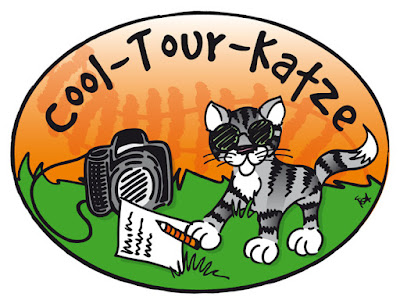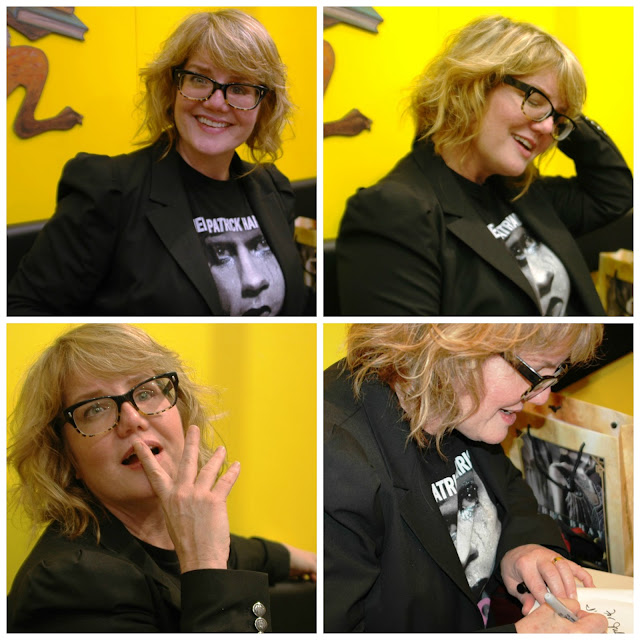Redakteur: Anette, Ina und Julia

Libby Bray im Interview zu ihrem neuen Roman „The Diviners – Aller Anfang ist böse“ erschienen bei dtv.

Why did you decide to write about the 1920s? I have to admit that I have never thought about this decade, I knew nothing.
You know, it’s a decade that long fascinated me and I think because it’s such a unique period of time and you can really look at this. It starts in 1920 and it ends with the crush in 29, so it’s about almost ten years, very colourful. And it’s such a fascinating period. So on the one hand you’ve got this non-stop party. And this non-stop party has been brought about in a way as the response to the horrors of World War I. And also to prohibition, you know, so effectively this is the response to the regulatory to drink. For me it’s also about the background, also in Jazz hits, like the Hip-Hop hits were in the 1980s. It changes everything, it’s not just the music, it’s the culture, you know, it’s a revolution in a way. And so you’ve got Jazz and you’ve got speek-easy culture, you’ve got the rise of organized crime. Because that’s what prohibition brings about. You’ve got women who just got into to vote, you’ve got the flappers, you’ve got these independent young women. It’s also the start of teenage culture in many ways. It’s like youth culture, so instead of teens looking to their parents, the parents were looking to the teens, because now it’s kind of this youth culture and there’s this Harlem renaissance with all these amazing writers coming up, african-american writers coming up. We are looking at it, all flashy shiny, but there is also dark stuff going on in the 1920s, a lot of it. There’s this rise in nativism, sort of uncomfortable. This thing the Americans don’t like to look at it. You know, it’s really about racism and xenophobia. There’s a lot of anti-immigration, because there has been a huge inflapse of immigrants coming to America. And suddenly there are all these… in a way prohibition is a reaction to that, because people don’t tend to look at the positive things. Prohibition came around and there was a temperance movement and they wanted to stop people from drinking. But why did they stop the people from drinking? Well, they thought it would be better for society, so in some cases they were reformers that were motivated by saying „Oh being drunk is bad for the family. These people are not like us. We need to change this. We’re gonna get rid of this aspect of their culture.“ Things like that we’re fascinating me, because they also influence so much really badly in legislation as well. It kind of infiltrates american life. And so book two, on which I’m working now, concentrates a lot of legislation, the chinese exclusion, the discrimination against asians, any kind of asian culture. Asians were not allowed to become citizens. They were solely excluded based on race, which is awful. That starts in 1882 and then again in 1902 and inventionly that piece of legislation curves all the way around to we can have only 3 percent of these people coming in. It gets more and more restrictive. So why is there this big party going on? All this kind of legislation that’s going on, that is really, really ugly. I was fascinated by – we were not tought any of that in history. In american history classes. That was very interesting to me, and important to look how we as americans apologize ourselfes. We like to think of ourselfes as the good guys, as the cowboys. And yet, if you look at our history there are a lot of things obviously like starting with the fact that we came over and actually committed genocide against the native americans, and then slavery and things like that, but… that’s one of the things that I find fascinating about time period. You’ve got this push-pull, on the one hand there’s this party, anything goes, shiny glitz-glamour, you’ve got a lot of great things happening, Jazz and the Harlem renaissance, we’ve got the vote for women, just great, but on the other hand you have got this sort of ‚Business of America is business‘, it’s really much about America’s business concerns, you’ve got this anything goes-environment until you’re just running up to this huge financial collapse and everybody’s just partying. I was really interested in that, wow, all of this champagne and confetti. The gap between the Haves and the Have-nots is wider and also like the labour-movement which is getting pushed against it this time as they try to make strides for bookers, because business is booming and you’ve got obviously many innovations, having radios huge, that was push-pull. That was a really long answer, I’m sorry.
No problem. How did you the research for your book, was it on the internet or did you go to museums about this time?
All of the above. I started by reading books, lots of different books, going through and see what I needed to know, so, many books… and then I went to the library, always good to have a library and friends, and I went to places like, in New York it is called the transit museum. So I went to their archive and went through photographs of subways being built during the 1920s and see what kind of the streets look like and looked at old subway maps and old subway cars. I contacted two different historians who took me on walking tours, one to the lower East Side, one in Harlem. We talked about how many has really changed through the 1920s, what used to be where. I went to the museum of radio and television in New York, I think it’s called the Paley Center now. I listened to old radio of the 1920s including broadcast and when Lindberg landed in the States. A lot of stuff I got from the internet too… I‘d shuttered to think about my search history… if they ever pull that up „You researched immigration stats and serial killers“ But I did. I researched serial killers, I researched the cold stuff, I went to Salem to look at their museum because they have a lot of stuff about early witchcraft and things like that. And I went on the internet and also I hired a professional researcher. So if there was something, there was Lisa Gold. Sometimes there are things that you just find hard on your own and so I could call her and say like okay, like I wanted primary ressources for the fall easy girls. I wanted to hear from the fall easy girls themselves, what their lives were like. And she found me some. That was really interesting. I like the research. And the thing is, it was kind of fun when I needed to research the numbers running. You know what that is?
Yes, since I read the book.
For that part I was researching it, I found a blog called „Digital Harlem“ that is runned by four australians, naturally. So one of the guys has written this book called „Playing the numbers – Gambling in Harlem between the wars“, so I got it when was coming out and as I was reading this, I found out that he was coming for three days to Columbia University to give a lecture and I got a ticket and went to this lunch where he was lecturing and backed to listen to him and talk and then got the book. So that was like „Ich habe Glück“. That was very lucky. That was like a lucky stroke.
So you spent a lot of time in research and all the details.
A lot of time and you know the thing is you never know what you need to know til you find out that you need to know it. Like… oh, wait a minute, I was talking about how I was writing this scene: They are driving a car and it’s raining. It’s like a throw in line, it was something about the windshield wipers. Wait a minute… how did windshield wipers work? And that’s the thing that happens all the time if you write. It’s like this. I just want to write that they drive down the street, but I have to find out how windshield wipers work. It’s about vacuum and sometimes the windshield wipers get stuck and you have to reach over and fix them. Just in case that it ever comes up on a quiz how windshield wipers worked in the 1920s. „Bitteschön.“
There are really many characters in the book. Is there one you especially like? I must admit, I was a bit confused at the beginning because there are so many people and they don’t have a big part in the book. I think it will come in book two then, but so many people and so many switches from one to another…
It’s a lot of head-hopping as we call it. And it’s hard for me as well, because there are so many characters and trying to figure out how to make that particular storyline in that particular book part. And then to think about all the stuff that is coming and that was before to influence that to have all of these characters, their back stories, their emotions, what’s going on with them, their relationships. It’s like orchestration. And actually that’s part what me made so late with book two just trying to figure out how they all meet together. It’s killing me, what was I thinking? You know, I’ve always loved Stephen King, you know, horror. And I was re-reading Salem’s Lot and he goes into the heads of so many people in this town and you never feel lost. It’s kind of amazing the way he could give you the full story of a character in maybe a page and a half. I sometimes say to my students when we are talking about reading like a writer and that is what it’s like to read some part and think „How is he doing this? How is that working“. So I really sort of paid attention to the way that he would go. Hopefully it works but is demanding, you’re right. It demands a certain kind of paying attention, because I was now here and there and here and there and here… It’s tough for me too. And I feel for all of them. I think that in different times different characters draw me in like obviously Memphis and Evie in the first book. And in the next book it’s Henry, a character that you only glimpse in book one and that becomes a big deal in book two. There is a character in China Town, we see her breathless, she is a hostess, her name is Ling and she is a big deal in book two. So she and Henry… that’s one of the things that makes it tough is to make them all come together. And not yet. And that’s because you’re working with racial devides and class devides and gender issues that have to be worked through in order to have these characters come together. And thought I really strongly about it, talked about it, because the book is about all of these things. They have to come together by degrees.
They already met eachother but they don’t know why. So the met in the first book, most of them. When will be the next book out?
It is now supposed to come out in the States in April. I actually wrote on the plane, I wrote in my hotel room yesterday, I write all the time. That’s really all I do.
How many books will there be?
Four. Four big books. Very looooooong books.
Do you know the series „Boardwalk Empire“?
Yes, but I didn’t want to see it because I was afraid of influence. The actor, Steve Buscemi, lives in my neighbourhood. So every now and then I’ll be at the bagel store so see Steve Buscemi ordering bagels… But I would love to watch because it’s exactly the kind of thing that I love. But I was just too afraid of the influence.
So just finish the four books and watch „Boardwalk Empire“!
I’ll be on a walker and 82…
No, one book one year at last!
I think I’ll get them out every two years. It’s the research, the orchestration of writing. But an interesting notice, during book two I wrote large chops of book three. That’s how it works when you try to figure out one thing that means to go over here.
Then the fourth will be the hardest because you have to write everything in this book, maybe around 1000 pages?
Oh gosh. Yes, I wouldn’t be surprised if there is a split in book four between book four and book five. Because I imagine that there is gonna be lot to be told. It’s funny, because I know in my head so many things that I want to have happen, but I have to see if they actually get happen or not. Sometimes you’re writing something and you just realize there’s not room. Or if I had ten books there would be room or sometimes I research something and I’ll be really into it, the greatest thing ever, I really want to write about it, but then you realize that’s not moving the story forward at all. I would say this was the hardest book, book two. Having written a trilogy the first time around I remember how you put something wrong in book one, it really bites you in book three. I find myself stopping – if I make that choice now, what’s gonna happen in four? But sometimes you just have to go with that.
Do you like the german cover? It’s a mixture of the movie covers from The Great Gatsby and Metropolis.
Oh, I really do like. Yes, Metropolis, I actually watched Metropolis again before I started this.
And what about the american version?
On the original hardcover there was an old skyline of New York and then there was an eye symbol in the middle and I really loved it. And then they changed it for the paperback, I think to make it look a little more commercial which I don’t love as much. I liked the hardcover.
Thank you for this interesting interview and have a good time at the book fair.
Thank you too, you also.

© Fotos: Anette, Interview: Julia und Ina




Hallo ,
hm, etwas Übersetzung hätte mir hier schon gefallen.
Guten Start ins Wochenende..LG..Karin..
Huhu,
im Moment sind wir noch ein bisschen im Aufbereitungsstress, es stehen ja noch zwei weitere Interviews aus & einige Berichte. Wenn etwas Ruhe einkehrt reichen wir die dt. Version (hoffentlich) noch nach. Hat zeitlich einfach nicht gepasst & zu lange Zeit zwischen Buchmesse, Rezension des Buches und Interview wollten wir halt auch nicht verstreichen lassen.
LG Anette